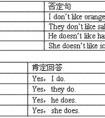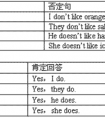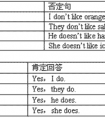根据括号内的要求进行句型转换。 1. I don't know where I should go. (变为简单句)I don't know where ________ ________. 2. You could write him a letter. (变为-八年级英语
He said to me, "I have taught English since he came here ."
→He told me that he had taught English since he came here.
(6)如果直接引语中含有情态动词 must, need, had better以及情态动词的过去式could, might, should, would,
在变为间接引语时,这些情态动词没有时态的改变。例如:
The teacher said to me . "You must pay more attention to your pronunciation."
→The teacher told me that I must (have to ) pay more attention to my pronunciation.
He said , "I could swim when I was only six ."
→He said that he could swim when he was only six.
(7)间接引语一般要用陈述句的语序,即主、谓、宾的顺序。例如:
He asked Lucy, "Where did you go?"→He asked Lucy where she went.
Tom said, "What do you want, Ann?"→Tom asked Ann what she wanted.
A.一般不表示请求或祈使的句子改为一个宾语从句
1.连词
若直接引语引号里的内容是陈述句,那么改为间接时,要用连词 that (可以省略)
……………….一般疑问句,…….,要用连词 if/whether (不可以省略)
……………….特殊疑问句,…….,要用连词 wh- 即特殊疑问词本身(不可省)
2.变化
(1)主句动词的变化
一般说来,主句谓语动词常为said或said to,变为间接引语时,当直接引语是陈述句时,said不变。
当直接引语是一般疑问句和特殊疑问句时,则要把said或said to变为asked / asked sb.
(2)从句人称的变化
由直接引语变间接引语时,从句的主语人称要遵循一主、二宾、三不变的原则。
①直接引语的主语是第一人称变为间接引语时要和主句的主语保持一致。
②如果直接引语的主语是第二人称变为间接引语时要与主句的宾语保持一致。
③如果直接引语的主语是第三人称变为间接引语时,人称不变。例如:
①They said, “We will go there by bus.” →They said they would go there by bus.
②She said to me, “Are you interested in science?” →She asked me if I was interested in science.
③His mother said to me, “He can't go to school.” →His mother told me that he couldn't go to school.
(3)、从句动词时态的变化
a. 如果主句的时态是一般过去时,从句的时态则应是与主句时态相应的过去时态。
①一般现在时→一般过去时;
②一般过去时→过去完成时;
③现在进行时→过去进行时;
④现在完成时→过去完成时;
⑤过去完成时→过去完成时(不变);
⑥一般将来时→过去将来时。例如:
The girl said, “I'm sorry for being late for class.” →The girl said that she was sorry for being late for class.
b. 直接引语变为间接引语时,如果主句中的谓语动词是一般现在时或一般将来时,则间接引语从句的时态保持不变。例如:
He says, “I have finished my homework.” →He says that he has finished his homework.
She will say, “I'll do it tomorrow.” →She will say that she'll do it the next day.
c. 直接引语如果是客观事实或真理,变为间接引语时,从句时态不变。例如:
The teacher said, “The earth moves around the sun.” →The teacher said that the earth moves around the sun.
(4)、指示代词、时间状语、地点状语和动词的变化
直接引语变为间接引语时,指示代词的变化为this→that, these→those等;
时间状语的变化为now→then, today→that day, yesterday→the day before, tomorrow→the next day等;
地点状语的变化为here→there;动词的变化为come→go(go 不要变come)。例如:
1. She said, “I will come this evening.” →She said that she would go that evening.
2. He said, “My sister was here three days ago, but she is not here now.” →He said that his sister had been there three days before, but she was not there then.
B.表示请求或祈使的句子改为句型tell/ask/order sb (not) to do sth
当直接引语引号里的内容表示要求时用tell sb (not) to do sth
当直接引语引号里的内容表示请求时用ask sb (not) to do sth
当直接引语引号里的内容表示强制要求时用order sb (not) to do sth
考点名称:宾语从句
- 宾语从句:
在句子中起宾语作用的从句叫做宾语从句。
宾语从句分为三类:动词的宾语从句,介词的宾语从句和形容词的宾语从句。
宾语从句连接代词主要有:
who, whom ,whose ,what ,whoever ,whomever ,whosever, whatever, whichever 等。 宾语从句的特点:
1.宾语从句可以作及物动词、介词及形容词的宾语。
2.宾语从句的语序一律用陈述句语序。
3.连接词that引导宾语从句在句中无词义,不充当句子成份,多数情况下可以省略。
4.whether 和 if 都可引导宾语从句,但 whether后可紧跟or not;whether从句可作介词的宾语。
5.如果从句太长,可以用形式宾语it.宾语从句的时态:
1.主句是一般现在时,从句根据实际情况使用任何时态。
例句:The headmaster hopes everything goes well.
2.主句是过去时态,从句须用过去时态的某种形式。
例句:She was sorry that she hadn’t finished her work on time.
3.当宾语从句表示的是一个客观真理或者事实时,即使主句是过去时,从句也用一般现在时态。
例句:The teacher told his class that light travels faster than sound.
4. 如果从句的动作发生在主句之前,则从句要用过去完成时态。
宾语从句的语序:
A. 宾语从句必须用陈述语序。
False: He is wondering when can he finish this difficult job.
Right: He is wondering when he can finish this difficult job.
B. 有时候可以用it 作形式宾语,而把真正的宾语从句放在后面。
Bad: I thought that he could finish this job in just two hours impossible.
Good: I thought it impossible that he could finish this job in just two hours.
C. 带有宾语从句的复合句的否定形式一般是否定主句。
Bad: I think he doesn’t like the English teacher.
Good: I don’t think he likes the English teacher.
D. 主句一般过去时态,从句也要用过去时态。
False: He wanted to know why he is crying in the corner.
Right: He wanted to know why he was crying in the corner宾语从句的否定转移:
主句的谓语动词是think,believe,imagine,suppose,consider,espect,fancy,guess等。
并且主句的主语是第一人称而且为一般现在时,从句的否定词一般要转移到主句上来,其反义疑问句一般与宾语从句一致。
I don’t think he will come to my party.而不能说成I think he won’t come to my party.
我认为他不会来我的舞会.
I don’t believe that man is killed by Jim,is he?
我认为那个人不是Jim所杀的,是不是?
如果宾语从句中有某个含有否定意义的形容词或副词,其反义疑问句要用肯定形式。
We find that he never listens to the teacher carefully,does he?
我们发现他从来不仔细听老师讲课,是不是?宾语从句中引导词的用法比较
在复合句中作主句的宾语,引导词有:
连词:that (that 常可省略),whether, if
代词:who, whose, what ,which
副词:when ,where, how, why 等。
(一)that引导的宾语从句(在非正式场合that可以省略)
1.可跟that从句做宾语的动词有:
say, think, insist, wish, hope, demand, imagine, wonder, know, suppose, see, believe, agree, admit, deny, expect, explain, order, command, feel, dream, suggest, hear, mean, notice, prefer, request, require, propose, declare, report等。
例句:The boy believes that he will travel through space to other planets.
注意事项:当主句谓语动词是 think, believe, suppose, expect 等词,而宾语从句的意思是否定时,常把否定转移至主句表示。
例句:I don’t think it is right for him to treat you like that.
2.在以下情况中that不能省略
a.当句中的动词后接多于两个由that引导的宾语从句时,第一个that可省,但后面的that不可省。
例句:He said (that) you were too young to understand the matter and that he was asked not to tell you.
b.当主句的谓语动词与that宾语从句之间有插入语时,that一般不可省。
例句:Just then I noticed, for the first time, that our master was wearing his fine green coat and his black silk cap.
c.当that从句是双宾语中的直接宾语时,that不可省。
例句:I can’t tell him that his mother died.
d.注:许多带复合宾语的句子,that引导的宾语从句经常移到句子后部,而用it作形式宾语。
例句:I find it necessary that we should do the homework on time.
(二)由whether,if 引导的宾语从句
- 最新内容
- 相关内容
- 网友推荐
- 图文推荐
| [家长教育] 孩子为什么会和父母感情疏离? (2019-07-14) |
| [教师分享] 给远方姐姐的一封信 (2018-11-07) |
| [教师分享] 伸缩门 (2018-11-07) |
| [教师分享] 回家乡 (2018-11-07) |
| [教师分享] 是风味也是人间 (2018-11-07) |
| [教师分享] 一句格言的启示 (2018-11-07) |
| [教师分享] 无规矩不成方圆 (2018-11-07) |
| [教师分享] 第十届全国教育名家论坛有感(二) (2018-11-07) |
| [教师分享] 贪玩的小狗 (2018-11-07) |
| [教师分享] 未命名文章 (2018-11-07) |






